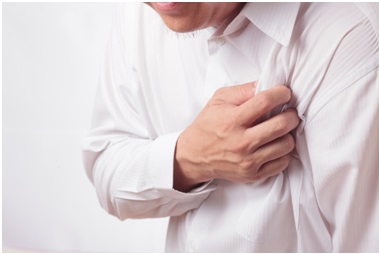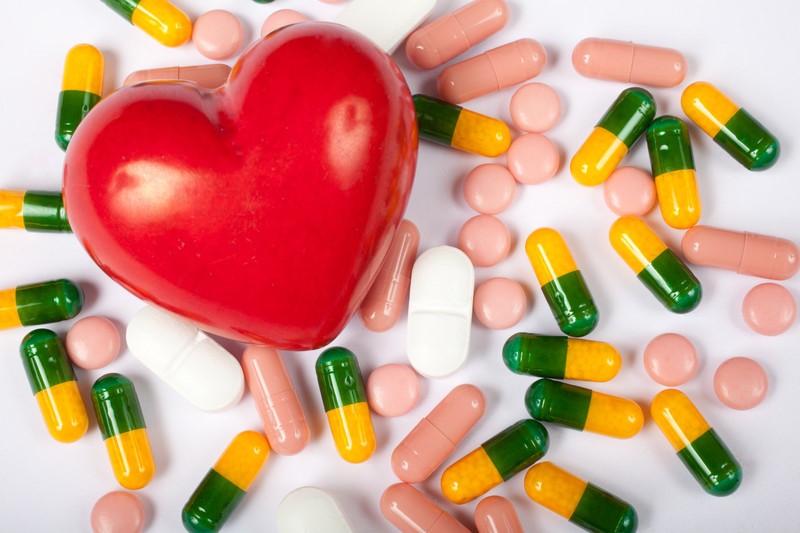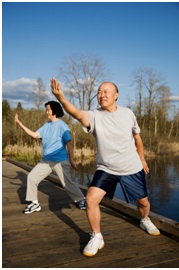| |
Oral Antianginal Drugs
|
 |
Angina
|
Angina is chest pain or discomfort caused when your heart muscle does not get enough oxygen-rich blood. The pain is usually triggered by physical activity or stress, relieved by rest, and typically only lasts for a few minutes (angina attack). It may feel like pressure or squeezing in your chest. The discomfort may radiate to your shoulders, arms, neck, jaw, or back. Angina pain may even feel like indigestion. However, angina is not a disease. It is a symptom of an underlying heart problem and is usually a symptom of coronary heart disease (CHD).
|
Heart diseases were the third common causes of death in Hong Kong in 2012. Among these heart diseases, CHD was the dominating component which made up 68% of heart disease deaths. CHD happens when a sticky substance called plaque builds up in the arteries that supply blood to the heart. As a result, the arteries are hardened and narrowed, and blood flow is reduced and the heart muscle cannot get enough blood. If blood flow does not improve, heart muscle deprived of oxygen dies – a heart attack. Risk factors that increase your risk of CHD and angina include tobacco use, diabetes, high blood pressure, high blood cholesterol level, personal or family history of heart disease, older age, lack of exercises, obesity and stress. Some of these factors are avoidable or treatable.
There are three main types of angina:
- Stable angina: The most common type and has a regular pattern. Attacks occur due to an obvious trigger (such as exercise). Rest and medicines usually help.
- Unstable angina: More unpredictable and the most dangerous. Attacks occur without any obvious trigger and continue despite resting or medicine. It is a sign that you could have a heart attack soon. If there is a change in your usual pattern of angina and an attack lasts longer than expected, it may be unstable angina. It is a medical emergency and should be admitted under hospital care.
- Variant angina: Rare. Attacks usually occur when you are resting. Medicines can help.
Many people with chest pain fear a heart attack. However, there are many possible causes of chest pain. Any organ or tissue in your chest can be the source of pain, including your heart (e.g. angina, pericarditis), lungs (e.g. pulmonary embolism), oesophagus (e.g. gastroesophageal reflux), ribs (e.g. inflammation of ribs), muscles or tendons (e.g. strain of muscle and tendons between the ribs), or nerves (e.g. shingles). Therefore, you should consult your doctor for a diagnosis if you have chest pain.
|
|
|
▲ back to top
Treatment of angina |
Treatment for angina aims to relieve the symptoms during an angina attack, reduce the number of angina attacks that a person has and reduce the risk of further complications such as a heart attack or stroke. A number of medications can be used to achieve these. Some of these are only taken when needed, while others are taken everyday. If the symptoms do not respond to medication, doctor may recommend surgery to widen or bypass the narrowed arteries.
All the registered antianginal drugs in Hong Kong are available in oral dosage forms e.g. tablets, capsules and sublingual spray. Some of them are also available in injectable forms and transdermal patches. Most oral products are prescription-only medicines (except glyceryl trinitrate tablets and sublingual spray which are pharmacy-only medicines) and should be administered strictly under doctor’s instruction and recommendation. On the other hand, glyceryl trinitrate patch is a pharmacy-only medicine, while its injection is a prescription-only medicine.
|

|
|
|
▲ back to top
Classification of oral antianginal drugs |
Antianginal drugs are used to provide immediate relief from symptoms and prevent angina attacks. If your risk of having a heart attack or stroke is high, it should be possible to reduce the risk by using a combination of medication and lifestyle changes. Guidelines recommend initial treatment with one or two antianginal drugs, plus aspirin, possibly an angiotensin-converting enzyme inhibitor, and a statin for secondary prevention of cardiovascular disease.
The antianginal drugs recommended for initial treatment are β-blockers and calcium channel blockers, which reduce myocardial ischaemia by heart rate reduction and vasodilatory mechanisms respectively. Your doctor will usually prescribe either or both of these drug classes, together with a short acting nitrate for prompt alleviation of angina attacks. However, if these drugs are not tolerated, are contraindicated, or fail to correct symptoms, alternative antianginal drugs are available, such as oral long-acting nitrates and newer antianginal drugs.
|
 |
Immediate relief from symptoms
Short-acting nitrates: often used to treat angina. Nitrates relax and widen your blood vessels, allowing more blood to flow to your heart muscle. The most common nitrate used to treat angina is glyceryl trinitrate (GTN) tablets (to be put under your tongue).
Preventing angina attacks
| 1) | β-blockers: make the heart beat slower with less force. That means the heart needs less blood and oxygen after exercise, which can either prevent angina or reduce the frequency of attack. Examples are propranolol, atenolol, metoprolol, carvedilol, etc. |
| 2) | Calcium channel blockers: relax the muscles that make up the walls of your arteries, increasing the blood supply to the heart. Examples are amlodipine, diltiazem, felodipine, nifedipine, verapamil, etc. |
| 3) | Long-acting nitrates: action similar to GTN. Designed for the long-term prevention of symptoms. Examples are extended release isosorbide dinitrate and isosorbide mononitrate. |
| 4) | Ivabradine: selective sinus node If inhibitor, with effect similar to β-blocker – slows down the speed of your heart beat. Often used in patients unable to take β-blockers for medical reasons. |
| 5) | Trimetazidine: metabolic agent which maintains proper energy metabolism during ischaemia. |
|
|
|
▲ back to top
Common side effects and precautions
Drug class
|
Common side effects
|
Precautions
|
| Immediate relief from symptoms |
| 1. Glyceryl trinitrate |
- Postural hypotension
- Tachycardia (paradoxical bradycardia also reported)
- Throbbing headache
- Dizziness
- Flushing
|
- Place sublingual tablet under the tongue and do not chew or swallow it
- Seek medical care if pain persists after a total of 3 doses in 15 minutes
- Do not drive or operate machinery if affected by dizziness
- Use with caution in severe hepatic and renal impairment
- Contraindicated in hypersensitivity to nitrates, hypotensive conditions and hypovolaemia, hypertropic cardiomyopathy, aortic stenosis
- Avoid abrupt withdrawal
|
Preventing angina attacks |
| 2. β-blockers |
- Fatigue
- Coldness of extremities
- Sleep disturbance with nightmares
- Blood glucose disturbance
- Gastrointestinal disturbance
- Bradycardia
- Heart failure
- Hypotension
- Conduction disorders
- Peripheral vasoconstriction
- Dizziness
|
- Caution in patients with diabetes, history of obstructive airway disease (introduce cautiously and monitor lung function), myasthenia gravis
- Reduce dose in patients with renal or hepatic impairment
- Contraindicated in patients with second- and third-degree heart block
- Avoid in patients with uncontrolled heart failure, asthma, marked bradycardia, hypotension, severe peripheral arterial disease and certain conduction disorders
- Avoid abrupt withdrawal
|
| 3. Calcium channel blockers |
- Constipation
- Headache
- Tachycardia
- Dizziness
- Rash
- Fatigue
- Flushing
- Nausea
- Oedema (notably of ankles)
|
- Caution in first-degree AV block
- Contraindicated in patients with severe bradycardia; second- and third- degree AV block, sick sinus syndrome, acute porphyria
- Avoid grapefruit juice when taking certain calcium channel blockers such as nifedipine and verapamil
|
| 4. Long-acting nitrates |
- Postural hypotension
- Tachycardia (paradoxical bradycardia also reported)
- Throbbing headache
- Dizziness
|
- Caution in severe hepatic and renal impairment
- Contraindicated in hypersensitivity to nitrates, hypotensive conditions and hypovolaemia, hypertropic cardiomyopathy, aortic stenosis
- Avoid abrupt withdrawal
|
| 5. Ivabradine |
- Bradycardia
- First-degree heart block
- Headache
- Dizziness
- Visual disturbance
|
- Caution in hepatic and renal impairment
- For angina, contraindicated in patients with heart rate below 60 beats per minute
- Contraindicated in unstable or acute heart failure; acute myocardial infarction; unstable angina; sick sinus syndrome, second- and third-degree heart block; patient dependent on pacemaker
|
| 6. Trimetazidine |
- Gastrointestinal disturbance
- Dizziness
- Headache
|
- Caution in moderate renal impairment, and in elderly over 75 years older
- Caution especially in patient taking antihypertensive as the drug may cause gait instability or hypotension, and increasing the risk of fall
- Contraindicated in Parkinson disease, parkinsonian symptoms, tremors, restless leg syndrome, and other related movement disorders, severe renal impairment
- Review patient (especially elderly) regularly for parkinsonian symptoms
|
|
|
▲ back to top
General advice
|
- Adopt a healthy lifestyle as it is the most effective way of reducing your risk of angina. This can be achieved by the following ways:
- Limit alcohol consumption. Drinking above the maximum recommended limits can raise your blood pressure. The recommended maximum daily alcohol intake is 3-4 units for men and 2-3 units for women*. One unit is roughly equivalent to half a pint of beer or a single measure (25ml) of a spirit such as vodka or whisky.
- Stop smoking and avoid exposure to secondhand smoke. Smoking can increase your risk of both heart attacks and strokes.
- Maintain a healthy weight. If you are overweight, your heart needs to work harder to pump blood around your body which can raise your blood pressure.
- Exercise regularly. Exercise can keep you heart and blood vessels in good condition. Talk with your doctor about a safe exercise plan.
- Avoid stress. Engage in healthy activities to reduce tension and stress.
|
 |
- Eat a balanced and healthy diet:
- Eat lots of fibre with whole grains and a variety of fruit and vegetables can help to keep your body in good condition.
- Avoid foods high in saturated fats such as butter, fatty meat and fried food as high-fat foods can cause plaques to build up in your arteries.
- Eat a small amount of unsaturated fat such as oily fish (salmon, mackerel, etc.), nuts and seeds as they can increase the level of good cholesterol and help reduce any blockage in your arteries.
- Cut down on the amount of salt in your food as it can raise your blood pressure.
- Take antianginal drugs as prescribed and follow your doctor’s instruction to prevent your heart disease and angina from getting worse.
- Adhere to your drug therapy for other diseases that can increase your risk to angina, such as diabetes, high blood pressure and high cholesterol.
- Do not take vitamin or fish oil supplement to treat stable angina. There is no evidence that they can help.
- If you feel light-headed after taking GTN, sit down or find something to hold on.
- Pace yourself and take rest breaks as angina is often brought on by exertion.
|
*National Health Service (England) |
|
|
|
▲ back to top
Communication with your doctor
|
|
- Communicate with your doctor for the best treatment option. Your doctor will prescribe the most appropriate drugs for you after considering your condition and your response to the drugs.
- Watch out for any unusual and serious side effects that develop. If you experience any such symptoms, contact your doctor immediately.
- Do not stop any of your medicines before consulting your doctor. Stopping these drugs suddenly or changing your dose can make your angina worse or cause a heart attack.
- Inform your doctor of your medical history, as some diseases may warrant special precautionary measures.
- Tell your doctor if you are currently taking other drugs as the drugs may interact with antianginal drugs and cause dangerous side effects (e.g. patient should not use GTN for at least 24 hours before or after taking sildenafil).
- Tell your doctor if you are pregnant or breast-feeding as some antianginal drugs should be avoided.
|
 |
|
|
|
▲ back to top
Storage of antianginal drugs
Antianginal drugs should be kept in a cool and dry place. Unless specified on the label, medicines should not be stored in refrigerators. Glyceryl trinitrate (GTN) tablets should be kept in a glass container of no more than 100 tablets, with a foil-lined cap and no cotton wool wadding. GTN tablets should be discarded after 8 weeks in use. Furthermore, antianginal drugs should be kept properly in places unreachable by children to prevent accidental ingestion.
|
|
▲ back to top
|
|
Acknowledgement: The Drug Office would like to thank the Professional Development and Quality Assurance (PD&QA) for their valuable contribution to the preparation of this article.
|
|
|
|
|


